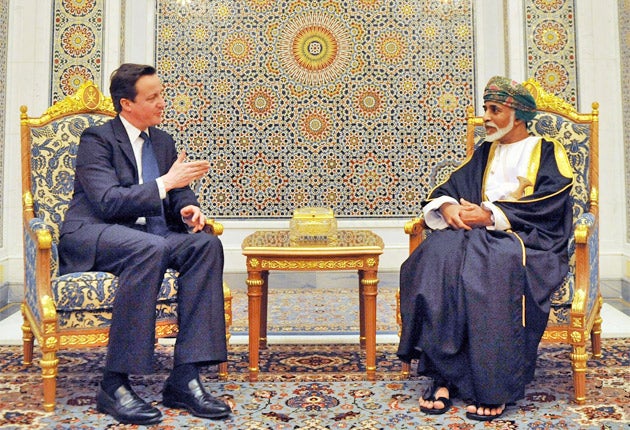Fury at Omani sultan's cash for Cambridge

Your support helps us to tell the story
From reproductive rights to climate change to Big Tech, The Independent is on the ground when the story is developing. Whether it's investigating the financials of Elon Musk's pro-Trump PAC or producing our latest documentary, 'The A Word', which shines a light on the American women fighting for reproductive rights, we know how important it is to parse out the facts from the messaging.
At such a critical moment in US history, we need reporters on the ground. Your donation allows us to keep sending journalists to speak to both sides of the story.
The Independent is trusted by Americans across the entire political spectrum. And unlike many other quality news outlets, we choose not to lock Americans out of our reporting and analysis with paywalls. We believe quality journalism should be available to everyone, paid for by those who can afford it.
Your support makes all the difference.Cambridge University is at the centre of a row over ethical funding of universities after accepting a new donation from the Oman government to promote religious understanding. The deal, signed only two weeks ago, is the second substantial donation the university has received from the Sultanate – bringing total funding to the university to well over £4m.
The university has also received £8m from the House of Saud to set up a new centre for Islamic studies.
Last night a newly created students' group, campaigning to promote "clean" funding of universities, called on the university to refuse to accept any more cash from either regime – on the grounds it could be compromised.
Jamie Scott, from the University of Cambridge Liberal Democrats' group, said: "This means no more handling of Oman's cheques before they introduce democratic freedom. This means no more funding from the House of Saud, as it accepted in 2008: not while their regime refuses its citizens the right to peaceful protest."
Sam Westrop, spokesman for the campaign from York University, added: "Accepting money from despots around the world may seem financially beneficial, but indisputably leads to a loss of academic objectivity."
The campaign has already won support from 20 universities.
The Cambridge deal, financed by Sultan Qaboos to set up a professorship of the Abrahamic Faiths and Shared Values within the university's faculty of divinity, was signed on 23 February. Since then, the Sultan has sacked a total of 12 ministers in an attempt to head off any rebellion in his country. It follows an earlier £2.8m donation from the Sultan to set up a professorship of modern Arabic within the university. Following this, a further £300,000 was donated to support a fellowship in oriental studies at the university's Pembroke College.
The Saudi cash went to set up the HRH Prince Alwaleed Bin Talel Centre in Islamic Studies. The Prince is a senior member of the royal family.
The earlier two donations were cited in a report by the Centre for Social Cohesion, which voiced "substantial concerns" over the way in which universities are currently funded.
"The UK's finest universities are taking money from some of the world's worst dictatorships. Iran, Saudi Arabia and China, all nations with appalling human rights records, are significant contributors to venerable UK institutions," it said.
Cambridge University insisted last night that each donation had been approved by its ethics committee – and that there was no question of any threat to academic freedom.
It stressed that Prince Alwaleed Bin Talel had been a prime mover in democratic reforms within Saudi Arabia.
The controversy comes just days after Sir Howard Davies, vice-chancellor of the London School of Economics, resigned over accepting a £1.5m donation to the university from the Gaddafi Foundation, run by one of the dictator's sons, Saif al-Islam.
Robert Halton, Conservative MP for Harlow, said: "The Government should establish much stricter guidelines around donations to UK universities."
Around the region
Egypt
An Egyptian court yesterday rejected an appeal by ousted President Hosni Mubarak against a top prosecutor's move to seize funds that could total in the billions of dollars. The decision clears the way for a possible trial of Egypt's ousted leader. Meanwhile, Al-Jazeera reported that the armed forces detained the head of the state security services after last week confiscating documents they said showed evidence of human rights abuses.
Kuwait
Security forces stood by as more than 1,000 protesters yesterday called for sweeping political changes in Kuwait, the first such dissent in the emirate. The protest was held close to the offices of Kuwait's emir and the prime minister, who is accused by pro-reform groups of stifling political freedoms and muzzling dissent. One of the protest slogans said: "Leave! We deserve better!" Other protesters brandished banners saying: "New country with a new prime minister."
Yemen
Anti-government demonstrators in south Yemen are threatening to burn down schools if teachers and students do not join their protests in the port city of Aden, UNICEF said yesterday. The opposition coalition denied the claims. The reported threats on schools were the first of their kind since unrest hit Yemen in January, with protesters galvanised by successful uprisings in Egypt and Tunisia. Schools have been targeted in previous disturbances in Yemen.
Join our commenting forum
Join thought-provoking conversations, follow other Independent readers and see their replies
Comments